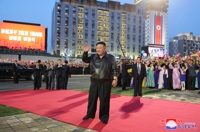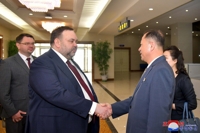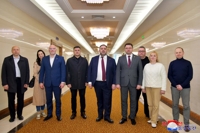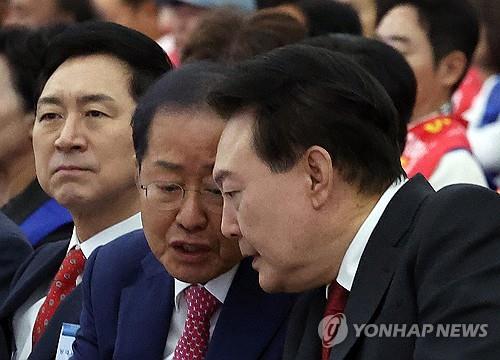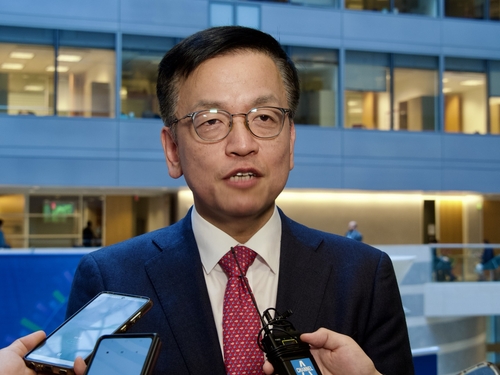(3rd LD) Park calls for int’l pressure on N. Korea over nuclear ambitions
(ATTN: UPDATES with MOUs between the two countries from para 11)
By Kim Kwang-tae
ADDIS ABABA, May 26 (Yonhap) -- South Korean President Park Geun-hye called on the international community Thursday to send a clear signal to North Korea that it will have no future unless it abandons its nuclear weapons programs.
Park said North Korea’s nuclear programs should never be tolerated as it poses a serious threat to the international community as well as Northeast Asia.
"Now, the international community should be united and put pressure on North Korea to make it recognize that it has no future unless it gives up its nuclear programs,” the president said in a summit with Ethiopian Prime Minister Hailemariam Desalegn, according to presidential spokesman Jeong Yeon-guk.
Hailemariam vowed to make an effort to get African countries to support denuclearization of the Korean Peninsula by exercising Ethiopia's influence on the continent, Jeong said after the summit.
The Ethiopian prime minister also said his country will faithfully enforce the toughest U.N. sanctions imposed on North Korea over its fourth nuclear test and long-range rocket launch earlier this year.
Hailemariam said Ethiopia will always stand with South Korea over North Korea’s irresponsible act that could destabilize the Korean Peninsula.
The comments came as North Korea ratcheted up its charm offensive toward South Korea by repeatedly offering talks.
South Korea has spurned the North’s overtures, noting denuclearization steps should be a "top priority" in resuming dialogue.
North Korean leader Kim Jong-un has called his country a "responsible nuclear state" in the latest sign that he would not give up nuclear programs.
The North has repeatedly pledged to boost its nuclear capability, viewing its nuclear program as a powerful deterrent against what it claims is Washington's hostile policy towards it.
After the summit, Park and Hailemariam observed some of the signings of 40 memorandums of understanding.
The MOUs call for, among other things, South Korea’s provision of a US$500 million loan to Ethiopia from 2016 to 2018, a move that Seoul says will help South Korean companies make inroads into the Northeast African country's market.
The African country -- five times the size of the Korean Peninsula -- is pushing to modernize its roads, electricity and other infrastructure. South Korean companies are seeking to participate in a highway project and others worth about $690 million.
Ethiopia is pushing to create a textile industrial complex for South Korean companies in a 1 square kilometer area in Adama, a city in central Ethiopia. It is also considering a move to offer tax benefits to South Korean textile companies to attract investment.
South Korea said its companies can ship textile goods to be produced in Ethiopia and these can be shipped to the United States and the European Union without tariffs, which could offer a competitive edge to South Korean companies.
South Korea and Ethiopia signed a double taxation avoidance pact that could facilitate South Korean companies’ investments in Ethiopia as the deal could reduce tax burdens on South Korean companies.
Hailemariam proposed that South Korea and Ethiopia cooperate in cybersecurity, with Park suggesting the two countries can cooperate in that area through an MOU that calls for cooperation in information, communication and technology.
The president also said South Korea will expand cooperation with Ethiopia in renewable energy sector as Hailemariam proposed that South Korean companies participate in the renewable energy sector.
Park’s state visit comes as South Korea is seeking to boost political and economic ties with Africa, which has emerged as a continent of opportunity in recent years.
Meanwhile, the two countries agreed to hold regular consultations on bilateral and multilateral issues.
South Korea then said it signed a deal with Ethiopia to pursue defense cooperation that can prevent the country from building up military cooperation with North Korea again.
Seoul said it shares a special affinity with Ethiopia over the African country's contribution of more than 6,000 troops to help defend South Korea in the 1950-53 Korean War.
The war ended with a cease-fire agreement, not a peace treaty, leaving South and North Korea technically at war.
Also Thursday, Park is set to meet with President Mulatu Teshome before attending a state banquet to be hosted by Hailemariam.
Ethiopia is the first stop on Park’s swing through Africa. The trip is set to take her to Kampala and Nairobi for talks with Uganda's president, Yoweri Museveni, and Kenyan President Uhuru Kenyatta.
entropy@yna.co.kr
(END)
-
 Defense chief says N. Korea's hypersonic missile 'unsuccessful' in last-stage glide flight
Defense chief says N. Korea's hypersonic missile 'unsuccessful' in last-stage glide flight -
 Relax, immerse yourself in scents at Venice Biennale's Korean Pavilion
Relax, immerse yourself in scents at Venice Biennale's Korean Pavilion -
 Overdue debut of Korean abstract art pioneer Yoo Young-kuk at Venice Biennale
Overdue debut of Korean abstract art pioneer Yoo Young-kuk at Venice Biennale -
 N. Korea has capability to genetically engineer biological military products: U.S. report
N. Korea has capability to genetically engineer biological military products: U.S. report -
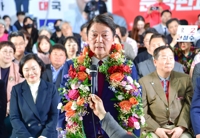 PPP lawmaker says entire Cabinet should resign over general elections defeat
PPP lawmaker says entire Cabinet should resign over general elections defeat
-
 Relax, immerse yourself in scents at Venice Biennale's Korean Pavilion
Relax, immerse yourself in scents at Venice Biennale's Korean Pavilion -
 Overdue debut of Korean abstract art pioneer Yoo Young-kuk at Venice Biennale
Overdue debut of Korean abstract art pioneer Yoo Young-kuk at Venice Biennale -
 Defense chief says N. Korea's hypersonic missile 'unsuccessful' in last-stage glide flight
Defense chief says N. Korea's hypersonic missile 'unsuccessful' in last-stage glide flight -
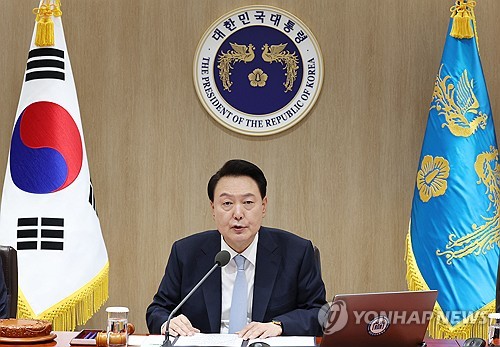 (LEAD) Yoon vows to improve communication with people after election defeat
(LEAD) Yoon vows to improve communication with people after election defeat -
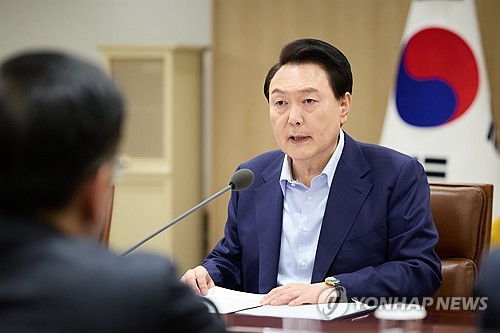 Yoon presides over emergency meeting on Mideast crisis
Yoon presides over emergency meeting on Mideast crisis
-
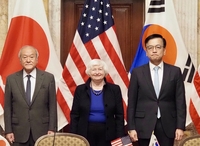 (4th LD) Finance chiefs of S. Korea, U.S., Japan recognize 'serious' concerns over 'sharp' won, yen depreciation
(4th LD) Finance chiefs of S. Korea, U.S., Japan recognize 'serious' concerns over 'sharp' won, yen depreciation -
 S. Korea to provide 100,000 tons of rice to 11 nations
S. Korea to provide 100,000 tons of rice to 11 nations -
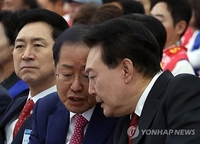 Yoon, Daegu mayor met to discuss post-election matters: sources
Yoon, Daegu mayor met to discuss post-election matters: sources -
 Facebook page unveils photos of BTS member V in counter-terrorism unit gear
Facebook page unveils photos of BTS member V in counter-terrorism unit gear -
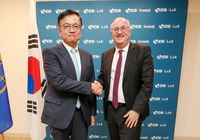 S. Korea to provide US$200 million in humanitarian aid to Ukraine this year
S. Korea to provide US$200 million in humanitarian aid to Ukraine this year
















